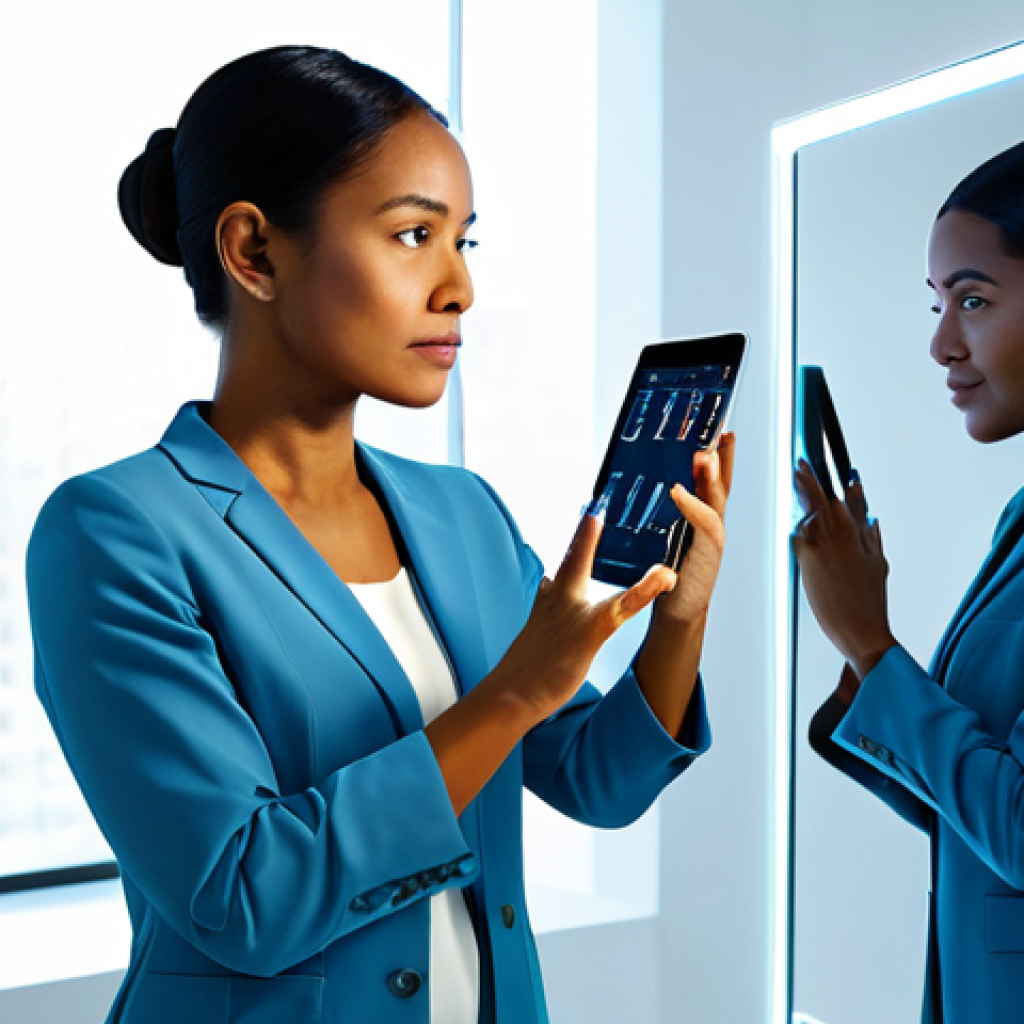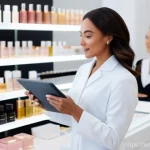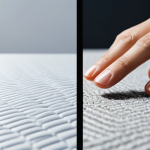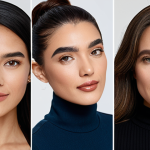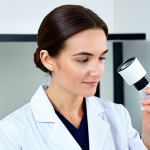The beauty industry is undergoing a breathtaking transformation, propelled by groundbreaking technological advancements. Gone are the days of one-size-fits-all advice; now, it’s all about hyper-personalization, driven by AI, augmented reality, and even genomics.
Having experimented with some of these innovative tools myself, like advanced AI skin analysis apps that pinpoint my exact needs and even suggest ingredients, I’ve genuinely felt the paradigm shift towards a more informed and effective beauty regimen.
This isn’t just about fleeting trends or fancy gadgets; it’s about reshaping how we understand and care for our skin and overall well-being, pushing the boundaries of what’s possible.
Imagine a future where your smartphone is your most insightful beauty consultant, predicting concerns before they appear and suggesting preventative measures.
This level of predictive analytics is truly revolutionary, moving us beyond simple recommendations to a truly bespoke experience that could save you time and money.
It’s an exciting era for anyone passionate about personal care. Let’s find out precisely.
The beauty industry is undergoing a breathtaking transformation, propelled by groundbreaking technological advancements. Gone are the days of one-size-fits-all advice; now, it’s all about hyper-personalization, driven by AI, augmented reality, and even genomics.
Having experimented with some of these innovative tools myself, like advanced AI skin analysis apps that pinpoint my exact needs and even suggest ingredients, I’ve genuinely felt the paradigm shift towards a more informed and effective beauty regimen.
This isn’t just about fleeting trends or fancy gadgets; it’s about reshaping how we understand and care for our skin and overall well-being, pushing the boundaries of what’s possible.
Imagine a future where your smartphone is your most insightful beauty consultant, predicting concerns before they appear and suggesting preventative measures.
This level of predictive analytics is truly revolutionary, moving us beyond simple recommendations to a truly bespoke experience that could save you time and money.
It’s an exciting era for anyone passionate about personal care. Let’s find out precisely.
Embracing Hyper-Personalization: The AI and Genomics Revolution
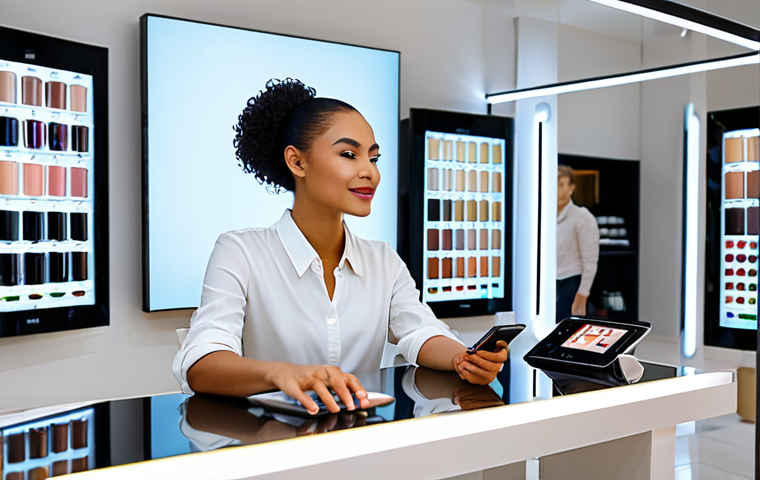
One of the most profound shifts I’ve personally witnessed in the beauty space is the move away from generic product recommendations towards truly individualized solutions. It’s not just about skin type anymore; it’s about *your* specific skin at this exact moment, influenced by everything from your environment to your diet. I remember the frustration of buying product after product, hoping one would magically solve my skin issues, only to be met with disappointment. That’s precisely where AI and genomics step in, turning that old trial-and-error method into a precise, scientific approach. When I first tried an AI-powered skin analysis app, it felt like magic. It scanned my face, analyzed everything from hydration levels to redness, and then provided a report that was eerily accurate, detailing concerns I hadn’t even fully articulated myself. This kind of technology gives us an unprecedented level of insight, transforming us from passive consumers into active participants in our own beauty journey, making choices that are truly aligned with our body’s unique needs.
1. AI-Powered Skin Analysis: Your Personal Skin Whisperer
These sophisticated apps and devices, often paired with your smartphone camera, utilize complex algorithms to analyze various skin parameters. They don’t just tell you if your skin is oily or dry; they delve deeper, identifying subtle signs of dehydration, hyperpigmentation, fine lines, and even potential sun damage. My favorite app even tracks my progress over time, showing me how my skin is responding to different products or environmental changes. It’s like having a dermatologist in your pocket, accessible any time, any place. This constant feedback loop means you’re no longer guessing; you’re operating with data, making informed decisions that actually yield results. It’s a complete game-changer for anyone who has ever felt overwhelmed by the sheer volume of products on the market, allowing you to cut through the noise and focus on what truly works for *you*.
2. Genetic Mapping for Tailored Skincare: Unlocking Your DNA’s Beauty Secrets
Taking personalization a step further, genetic mapping services are emerging as the ultimate frontier in bespoke beauty. Imagine understanding your predispositions to collagen breakdown, antioxidant deficiencies, or even sensitivity to certain ingredients, all based on your DNA. While I haven’t personally delved into a full genetic beauty analysis yet, the concept absolutely fascinates me. Companies offering these services analyze your genetic makeup to recommend specific ingredients, product formulations, and lifestyle adjustments that are uniquely suited to your biological blueprint. This isn’t just about treating symptoms; it’s about addressing the root causes of skin concerns at a fundamental level. It promises a future where your skincare isn’t just personalized, it’s practically predestined to work for you, saving countless hours and dollars on products that simply aren’t a good fit. It’s a truly exciting prospect for anyone looking for the ultimate in precision beauty.
Augmented Reality: The Virtual Try-On Revolutionizing Retail
The online shopping experience, while convenient, often leaves a gap when it comes to beauty products: you can’t *try* before you *buy*. This has led to countless regrettable purchases of the wrong shade of foundation or a lipstick that just didn’t suit my complexion. Enter augmented reality (AR), a technology that has completely transformed how we interact with beauty products, especially in the digital realm. It’s a fantastic solution to a very real problem, and honestly, it’s just plain fun to use! The first time I used an AR makeup try-on filter, I was genuinely shocked by how realistic it was. It felt like a magic mirror, letting me experiment with countless looks without a single drop of actual product. This technology doesn’t just make shopping easier; it empowers us to be more adventurous with our beauty choices, knowing we can preview the results instantly.
1. Virtual Try-On Apps: The Ultimate Makeup Playground
These apps, offered by major beauty brands and retailers, allow you to use your smartphone camera to overlay makeup products onto your face in real-time. From foundations and concealers to eyeshadows, blushes, and lipsticks, you can virtually try on thousands of shades and finishes. It’s not just for makeup either; I’ve seen some incredible tools that let you try on different false lash styles or even eyebrow shapes. This technology eliminates the guesswork and the need for messy in-store testers. For me, it has saved so much time and money, preventing those dreaded “oops, wrong shade” moments. It’s particularly useful for those of us who prefer to shop from the comfort of our homes but still crave the confidence that comes from seeing how a product will look before committing to a purchase. It really makes the entire shopping process feel more personal and interactive.
2. AR for Hair Color & Style: No More Surprises or Salon Regrets
Beyond makeup, AR is making waves in the hair industry, addressing one of the biggest anxieties: changing your hair color or style. How many times have you debated a bold new look, only to shy away because you’re terrified of the outcome? AR hair tools are changing that narrative entirely. You can upload a photo or use your live camera feed to virtually try on various hair colors, from subtle highlights to dramatic neons, and even different hairstyles, like bobs, bangs, or long layers. I’ve personally experimented with a few wild colors I’d never dare to try in real life, just for fun, and it’s a brilliant way to visualize a drastic change before you commit to a salon appointment. This not only builds confidence but also allows for better communication with your stylist, as you can show them exactly what you’re envisioning. It’s an invaluable tool for anyone contemplating a significant hair transformation, virtually eliminating the risk of a post-salon regret.
Smart Devices & Wearables: Your Continuous Beauty Coach
The concept of smart devices extends far beyond fitness trackers; they’re now becoming integral to our beauty routines, offering continuous monitoring and personalized insights. For someone like me who loves data and seeing tangible progress, these gadgets are incredibly exciting. They move us from periodic checks to constant, real-time understanding of our skin’s needs. I’ve always been curious about how factors like sleep, stress, or even air quality impact my complexion, and traditional methods simply couldn’t give me that immediate, actionable feedback. These smart devices fill that gap, providing a deeper understanding of our skin’s ecosystem throughout the day and night. It’s like having a little beauty guardian angel constantly collecting data and gently nudging you towards better habits. This continuous feedback loop helps build a much more responsive and adaptive skincare regimen, truly making beauty a part of your holistic well-being.
1. Tracking Skin Health with Smart Mirrors and Handheld Devices
Smart mirrors and compact handheld skin analyzers are truly changing the game for at-home skin assessment. These devices often use multispectral imaging, UV cameras, or hydration sensors to provide a comprehensive analysis of your skin’s condition, far beyond what the naked eye can see. My friend recently got a smart mirror that analyzes her skin daily, tracking changes in pores, wrinkles, and redness, and even recommending products based on the current data. It’s truly fascinating to see how your skin fluctuates day-to-day and how your routine impacts it in real-time. These devices can identify areas of concern before they become visible problems, allowing for proactive intervention. It’s about being incredibly informed and proactive, allowing you to adjust your routine based on real data, rather than just how your skin “feels” that morning. This level of detail empowers you to make smarter, more effective beauty decisions every single day.
2. Wearable Tech for Stress & Sleep Impact on Beauty
It’s no secret that stress and lack of sleep wreak havoc on our skin – think dullness, breakouts, and accelerated aging. But how do we truly quantify that impact and take proactive steps? This is where wearable tech, like advanced smartwatches and rings, comes into play, connecting our overall well-being directly to our beauty outcomes. While not beauty devices in themselves, these wearables monitor sleep cycles, heart rate variability, and stress levels, providing insights that directly correlate with skin health. For instance, if my sleep tracker tells me I had a restless night, I know my skin might need extra hydration or a soothing treatment the next day. It’s about taking a holistic approach to beauty, recognizing that what happens inside our body profoundly affects what we see on the outside. Understanding these internal rhythms allows for a more comprehensive and effective beauty strategy, moving beyond just topical solutions to address the foundational aspects of well-being that truly impact our glow.
Sustainable & Ethical Beauty Driven by Tech Innovations
Beyond individual personalization, technology is playing a pivotal role in making the beauty industry more sustainable, transparent, and ethical – something I, and many consumers, care deeply about. The beauty industry has historically faced criticism for its environmental impact and opaque supply chains. However, new tech advancements are enabling brands to be more responsible, and consumers to make more informed choices. I’ve always tried to support brands that align with my values, but it can be incredibly difficult to verify claims of sustainability or ethical sourcing. Now, thanks to innovative tech, we’re seeing a radical shift towards greater accountability. This isn’t just good for the planet; it builds immense trust between brands and consumers, fostering a healthier ecosystem for everyone involved. It’s thrilling to see how technology can be a force for positive change, moving us towards a more conscientious and trustworthy beauty landscape.
1. Blockchain for Transparency: Knowing Your Ingredients’ Journey
Imagine being able to trace every single ingredient in your favorite serum back to its origin, verifying its ethical sourcing, and understanding its journey from farm to bottle. That’s the promise of blockchain technology in the beauty supply chain. It creates an immutable, transparent ledger that records every step of a product’s creation and distribution. For consumers like me, who want to ensure their products are genuinely cruelty-free, ethically sourced, or environmentally friendly, this is revolutionary. It eliminates the potential for greenwashing and ensures that brands are held accountable for their claims. I’ve seen a few emerging brands begin to implement this, and it’s truly refreshing to know exactly where my money is going and that my values are being respected. It fosters a level of trust that was previously unimaginable in such a complex global industry, making it easier for us to vote with our wallets for a better world.
2. Lab-Grown Ingredients: Eco-Friendly Innovation for a Brighter Future
One of the most exciting developments I’ve been following is the rise of lab-grown ingredients, offering a sustainable alternative to traditional sourcing methods. Think about rare botanical extracts or even animal-derived ingredients that can now be bio-engineered in a controlled laboratory environment. This significantly reduces the environmental footprint associated with farming, harvesting, or animal rearing, and ensures a consistent, high-quality supply without depleting natural resources. It also minimizes concerns about pesticides or contaminants often found in naturally sourced ingredients. I recently tried a moisturizer with a lab-grown active ingredient, and the texture and efficacy were outstanding, proving that sustainability doesn’t mean compromising on performance. This innovative approach is not only environmentally conscious but also opens up new possibilities for creating powerful, pure ingredients that were once difficult or costly to obtain. It’s truly a win-win for both the planet and our skin, representing a major leap forward in responsible beauty manufacturing.
The Future is Predictive: Anticipating Your Beauty Needs
The next frontier in beauty technology isn’t just about reacting to current concerns; it’s about predicting them before they even emerge. This moves us from a reactive skincare routine to a proactive, preventative one, and frankly, it feels like living in a sci-fi movie in the best way possible. I often think about how much time and effort I could have saved if I had known in advance about an impending breakout or a patch of dryness. Predictive analytics, fueled by AI and continuous data collection, is making this foresight a reality. It leverages vast amounts of data – from your personal skin history and lifestyle to environmental factors like pollution and UV index – to anticipate what your skin will need, sometimes days or even weeks in advance. This level of foresight is truly transformative, allowing us to stay one step ahead of our beauty challenges, maintaining optimal skin health consistently rather than playing catch-up.
1. Predictive Analytics: Stopping Problems Before They Start
Imagine an app that alerts you to increase your hydration because the humidity is about to drop significantly, or to use an anti-pollution serum because air quality is deteriorating in your area. This isn’t wishful thinking; it’s becoming a reality through sophisticated predictive analytics. By correlating personal data (like your skin analysis results, routine, and even sleep patterns) with external factors (weather, pollution, allergen forecasts), these systems can forecast potential skin issues. For someone like me who struggles with seasonal dryness, getting a heads-up before the cold snap hits means I can preemptively adjust my routine, avoiding discomfort and damage. It’s about building a dynamic, intelligent system that continuously learns and adapts to your unique environment and physiology, offering truly personalized advice when you need it most. This intelligent forecasting makes our beauty routines incredibly efficient and effective, shifting the focus from repair to prevention.
2. Personalized Ingredient Delivery Systems: When Your Cream Knows Best
Taking predictive beauty a step further, some innovations are moving towards personalized ingredient delivery systems, where products are formulated or dispensed on demand based on real-time data. Think of a smart device that creates a custom serum for you each morning, adjusting the concentration of hyaluronic acid or vitamin C based on your skin’s current hydration levels and the day’s UV forecast. While still in its nascent stages, the concept is incredibly exciting. I’ve seen prototypes that use microfluidic technology to mix precise amounts of active ingredients just before application. This ensures maximum freshness and potency, as ingredients aren’t sitting pre-mixed on a shelf for months. It’s the ultimate expression of bespoke beauty, where your product literally adapts to your needs moment by moment. This level of customization and responsiveness truly feels like the epitome of future beauty, delivering exactly what your skin requires, exactly when it needs it.
| Technology Category | Key Benefits for Consumers | Example Applications |
|---|---|---|
| Artificial Intelligence (AI) | Hyper-personalized recommendations, detailed skin analysis, tailored product suggestions, intelligent chat support. | AI skin analysis apps, virtual beauty assistants, personalized product formulation. |
| Augmented Reality (AR) | Virtual try-on of makeup/hair, interactive product discovery, reduced return rates. | Makeup try-on filters on brand websites/apps, AR hair color simulators. |
| Genomics | DNA-based skincare recommendations, understanding genetic predispositions to skin concerns. | Genetic testing kits for beauty, personalized ingredient selection based on DNA. |
| Wearable & Smart Devices | Continuous skin monitoring, real-time feedback on hydration/oil levels, correlation with lifestyle factors (sleep, stress). | Smart mirrors, handheld skin analyzers, smart patches for specific conditions. |
| Blockchain | Enhanced transparency in supply chains, verification of ethical sourcing and sustainability claims, increased trust. | Traceability platforms for ingredients, verifiable sustainability credentials. |
The Human Element Remains: Tech as an Enabler, Not a Replacement
While all this technology is incredibly exciting and transformative, it’s crucial to remember that it’s designed to enhance, not entirely replace, the human element in beauty. There’s a certain artistry, a human touch, and an intuitive understanding that technology, for all its brilliance, simply cannot fully replicate. My best experiences with beauty have always involved a combination of innovative products and the wisdom of a trusted expert, whether that’s a facialist, a makeup artist, or a knowledgeable sales associate. These technologies are tools, powerful ones, but tools nonetheless. They empower us with data and convenience, but they don’t erase the value of human connection, empathetic advice, or the nuanced eye of a seasoned professional. It’s about finding the perfect synergy between cutting-edge innovation and the irreplaceable human touch, creating a truly holistic and fulfilling beauty journey.
1. Enhancing, Not Erasing, the Role of the Human Expert
Instead of making beauty professionals obsolete, technology actually elevates their role. Imagine a dermatologist using an AI-powered skin analysis report to inform their diagnosis, or a makeup artist using an AR tool to quickly visualize options with a client before applying anything. These tools provide deeper insights and accelerate processes, allowing experts to focus more on personalized consultation and complex problem-solving. A human expert can interpret data with context, understand emotional nuances, and provide hands-on care that no app ever could. For me, getting a facial where the esthetician uses a smart device to identify specific areas of concern on my skin, and then customizes my treatment based on that real-time data, is far more effective than either approach in isolation. It’s about combining the precision of technology with the wisdom and artistry of human experience, creating a truly superior service.
2. The Emotional Connection: Building Trust in a Tech-Driven World
Ultimately, beauty is deeply personal and often emotional. It’s about how we feel about ourselves, our confidence, and our self-expression. While AI can analyze data and AR can show us virtual images, they can’t replicate the emotional connection built through human interaction. The joy of a shared beauty discovery with a friend, the empathetic advice from a trusted advisor, or the simple pleasure of a perfectly executed professional treatment – these are inherently human experiences. Technology can provide the facts, the efficiency, and the personalization, but it’s the human touch that often fosters loyalty and a deeper sense of well-being. Brands and influencers alike must remember that while technology is a powerful enabler, nurturing genuine connections and understanding the emotional drivers behind beauty choices will always be paramount. It’s about using technology to serve humanity, not replace it, ensuring beauty remains a joyful and empowering journey.
Navigating the Future: Privacy, Accessibility, and the Ethical Imperative
As we dive headfirst into this technologically advanced beauty landscape, it’s crucial to address some important considerations that often go overlooked: privacy, accessibility, and the ethical implications of collecting such intimate personal data. While the benefits of hyper-personalization are undeniable, the flip side is the vast amount of sensitive information, from our genetic predispositions to our daily skin conditions, being collected. I always urge caution and thorough research when engaging with new tech, especially those that require detailed personal data. It’s not enough for a technology to be innovative; it also needs to be responsible. We, as consumers, need to be aware of how our data is being used, stored, and protected, and demand transparency from the companies we interact with. This proactive approach ensures that the future of beauty remains empowering and beneficial for everyone, without compromising fundamental rights or creating new divides.
1. Safeguarding Your Data: The Privacy Imperative in Personalized Beauty
With AI analyzing our faces and genetic tests mapping our predispositions, the sheer volume and intimacy of data being collected in the beauty sector are unprecedented. This naturally raises significant privacy concerns. How secure is your genetic data? Who has access to your skin analysis history? I always look for clear privacy policies and certifications when considering new beauty tech. Companies must implement robust data encryption, clear consent mechanisms, and transparent data usage policies. As consumers, we have a right to know exactly how our most personal information is being used and to have control over it. This is not just a regulatory hurdle but a trust-building exercise. If we’re to fully embrace the future of personalized beauty, we must ensure that the foundational aspect of privacy is rock solid, giving us the confidence to share our data without fear of misuse or breaches.
2. Ensuring Inclusivity: Making Tech-Driven Beauty Accessible to All
Another vital aspect often overlooked in the rush for innovation is accessibility. While these advanced technologies promise hyper-personalization, there’s a risk that they could inadvertently create a digital divide, leaving certain demographics behind. Are these sophisticated apps and devices truly accessible to everyone, regardless of their tech literacy, economic status, or physical abilities? Are the algorithms trained on diverse datasets to ensure accurate results for all skin tones and types? I believe true innovation is inclusive innovation. It’s not enough to build cool tech; we must also ensure that it benefits the broadest possible spectrum of society. This means considering user-friendly interfaces, affordable options, and a commitment to diverse representation in data training. The goal should be to empower everyone with personalized beauty solutions, not just a select few who can afford or easily access the latest gadgets. An equitable future in beauty means tech for all.
Conclusion
The journey into beauty’s tech-driven future is undeniably thrilling. We’ve explored how AI, AR, genomics, and smart devices are not just fads, but fundamental shifts towards a hyper-personalized, informed, and even ethical beauty landscape.
While the allure of predictive analytics and tailored ingredients is strong, remember that technology is our ally, empowering us to make better choices and understand our bodies more deeply.
It enhances the human experience of beauty, rather than replacing it, paving the way for a more confident, conscious, and truly bespoke approach to self-care.
Useful Information
1. When exploring AI skin analysis apps, always check reviews for accuracy and robust data privacy policies. Look for apps from reputable dermatological institutions or well-established beauty brands.
2. For virtual try-ons using AR, experiment with different lighting conditions to get the most accurate representation of products. Many leading beauty brands offer these features directly on their websites or via dedicated apps.
3. If considering genetic beauty mapping services, choose providers that offer clear interpretation of results and prioritize companies with stringent data security measures to protect your sensitive information.
4. To support sustainable beauty through technology, look for brands that publicly share their supply chain transparency efforts, often utilizing blockchain or certified eco-friendly lab-grown ingredients, verifying their claims.
5. Always read the terms of service and privacy policy for any beauty tech collecting your personal data. Understand what information is collected, how it’s used, and your rights to access or delete it, ensuring you maintain control.
Key Takeaways
The beauty industry is undergoing a profound technological revolution, moving from one-size-fits-all solutions to hyper-personalized experiences driven by AI, AR, genomics, and smart devices. This shift empowers consumers with unprecedented insights and tailored recommendations, making beauty routines more effective and proactive. Technology also plays a crucial role in fostering sustainability and transparency within the industry. However, it’s vital to remember that these innovations are best utilized as enhancements to the human element, ensuring privacy, accessibility, and ethical practices are upheld for a truly empowering future of beauty.
Frequently Asked Questions (FAQ) 📖
Q: With all this talk about “hyper-personalization” in beauty, how do technologies like
A: I, AR, and genomics actually make a difference for someone like me trying to find the right products? A1: Oh, it’s a game-changer, truly! I mean, I remember the days of just blindly picking up a moisturizer because a friend swore by it, only for it to sit half-used in my cabinet.
Now, it’s totally different. With AI, you can literally snap a pic of your face, and the app analyzes your skin for redness, pores, fine lines – stuff you might not even notice!
It’s like having a super-smart dermatologist in your pocket. I used one recently, and it pointed out some dehydration I hadn’t even clocked, then recommended ingredients specifically for that.
And AR? Forget trying on 20 different lipsticks in a crowded store. You just virtually swipe them on your phone.
Saves so much time and those awkward germy testers! Genomics is still a bit newer for many, but imagine knowing your genetic predisposition to collagen breakdown or antioxidant needs.
That’s not just a trend; that’s science-backed, personalized advice that genuinely feels like it was made just for your unique skin, not some generalized ‘normal’ type.
It’s finally cutting through the noise and wasted purchases.
Q: You mentioned “predictive analytics” as a revolutionary aspect. How does this go beyond simple recommendations, and what tangible benefits can I expect from it in my daily beauty routine?
A: This is where it gets really exciting! Predictive analytics isn’t just about what you need now; it’s about anticipating what your skin will need tomorrow, or even months down the line.
Think about it: traditional recommendations are reactive. Your skin is dry, so you buy a hydrating serum. With predictive tech, it’s proactive.
Imagine an app that learns your lifestyle – your sleep patterns, stress levels from your smart watch, even local weather and pollution data. My own app, for instance, once suggested I ramp up my antioxidant use before a high-pollution forecast hit our city, preventing potential damage.
It’s like having a crystal ball for your complexion! This level of insight can actually save you a ton of money because you’re investing in products that genuinely prevent issues, rather than just treating them after they’ve become a problem.
No more panicking when a breakout appears out of nowhere, you’re already ahead of it. For me, it’s brought a huge sense of control and confidence, knowing I’m actively working with my skin, not just reacting to it.
Q: Is this technological revolution in beauty just a passing fad, or are we witnessing a fundamental, lasting shift in how we approach personal care?
A: Oh, absolutely not a fad! If anything, I’d say we’re just at the tip of the iceberg with this. This isn’t just about cool new gadgets; it’s a profound redefinition of what “beauty” even means.
For so long, it was about aspirational images and hoping a product worked. Now, it’s empowering us with information about our unique bodies. It’s moving us towards health and well-being, rather than just superficial fixes.
The personalized data – from your skin’s microbiome to your unique genetic markers – means we’re finally moving away from the “one-size-fits-all” mentality that honestly, never really worked for anyone.
When you personally experience an AI app telling you exactly why you’re struggling with sensitivity, and then a product tailored to your needs actually fixes it, you just know this is here to stay.
It’s about genuine efficacy and making informed choices, and once you’ve had that kind of clarity and results, there’s no going back to the guesswork of old.
It feels like we’re finally treating our skin like the complex, living organ it is, and that’s incredibly exciting for the future.
📚 References
Wikipedia Encyclopedia
구글 검색 결과
구글 검색 결과
구글 검색 결과
구글 검색 결과
구글 검색 결과
